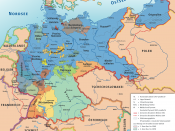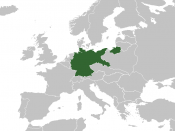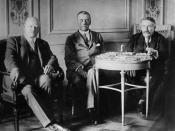History as a connotation has the ability to utilise past key events and personalities to shape and determine the ones in the present. The Weimar Republic has been a debatable event between historians, with the main conflict of its effectiveness and the way in which it has shaped Germany today. From the devastating, humiliating effect of the First World War , Germany's exertion to strengthen its economy and military led to the collapse of the once Hohenzollern Monarchy and a rise in the practical ideology of Democracy. Historians discuss that the Weimar Republic as a Democracy proved a significant rather valuable subject of the Weimer Republic; its many successes however, mirrored the failures leading to its collapse to the Extreme-Right wing party Leader - Hitler - after the great depression. The many attempts to overthrow the Weimer Government where agreed to be a result of the much-hated treaty of Versailles, positioning Germany in economic and political instability.
The Stresemann era however, proved to be a period of prosperity and appeasement as it brought along cultural transformation and the foreign policy of successes - until diminished by the Great Depression of 1929 and the ultimate collapse of the Weimar Republic to Adolf Hitler - Extreme right wing Nazi Leader.
"What we call the beginning is often the end. And to make an end is to make a beginning. The end is where we start from." - T. S. Eliot�
The election of Prince Max Von Baden as chancellor on the third of October was the beginning of the revolutionary emergence of Germany as a Democracy. The Monarch system came to an end as Kaiser Wilhelm II abdicated and Philip Schiedemann memorably declared Germany a republic in 1919 further appointing Fredrich Ebert as president. The German constitution being approved in July...


